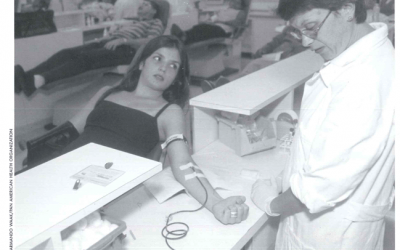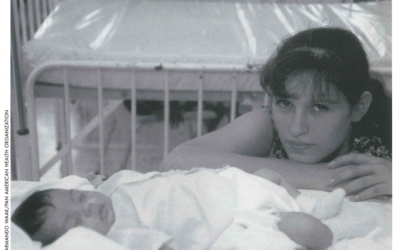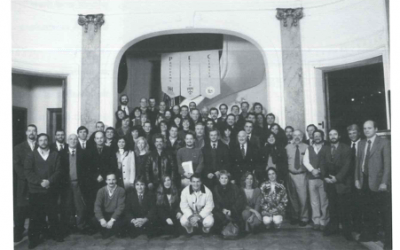Reaching Out

A THUNDER OF YOUTHFUL feet clambers up the once sedate stairway, and for a moment my mind races, too.. what have I done. But there is no need for panic as the first middle school visit to 61 Kirkland Street, made possible in part by the Center’s newly awarded Title VI National Resource Center Grant, is a resounding success.
A key component of DRCLAS outreach efforts, school visits pair students in grades six through twelve with Harvard scholars and artists involved in the Latin American and Latino Art Forum.
The thirty-five bilingual students from Martin Luther King Middle School in Dorchester, ages 11-14, talked with guest artist Dominique Pepin, whose photos “Of Reflections and Ceremonies: Meeting with a Mazatec Shaman” were on exhibit and then set off for a guided tour of the Peabody Museum’s Mayan collection. The students hailed from several different Latin American countries, a few arriving just weeks before in the U.S. Their enthusiasm that day was infectious: students found respect afforded their diverse cultural backgrounds, teachers found lively resources to weave with state curriculum frameworks, and the visiting artist found herself profoundly inspired, as she later wrote in a message to the students:
My time at DRCLAS was rewarding and inspirational… I would have loved to continue the discussions we started. I was surprised by all of your clever questions and beautiful understanding of my work. It confirmed the potential of youth and the respect that we must have towards you.
That rewarding autumn day, and many more to come, took root last spring when the David Rockefeller Center won the designation of Title VI National Resource Center (NRC) from the U.S. Department of Education. Title VI funding supports and enhances the Center’s ongoing outreach projects and enables DRCLAS to create and develop new programs that make Latin American resources at Harvard more accessible to the public whether school children or teachers, journalists, business leaders, artists or activists. For example, now we can “put our money where our mouth is’ in efforts to reach traditionally underrepresented groups by means of funds that help cover transportation costs to Center events for lower-income school districts. The application that schools make for the funding provides us with valuable assessment information on school cultures and classroom follow through.
Thanks to Title VI funding, outreach staff is busy developing an addition to the DRCLAS website (www.fas.harvard.edu/
-drclas) dedicated to educators and the community at large. We are planning an informative and interactive space to foster dialogue and increase public awareness of our resources. The Center sees itself as a partner in a community of learners and activists, and NRC funding will ensure that we can build on our successful outreach activities and partnerships.
CONTINUING PROGRAMS SUPPORTED BY TITLE VI
In conjunction with the Global Education Office of the World Affairs Council in Boston, DRCLAS sponsors professional development workshops for public school teachers on Latin American themes, a Latin American studies curriculum resource center, and a Latin American speakers bureau which places Harvard graduate students and other scholars in elementary, secondary and community college classrooms. With the Harvard Graduate School of Education, the Center supports the Teachers as Schol- ars program, offering in-depth, high-level seminars for high school teachers; language immersion institutes for teach- ers of Spanish and Portuguese are also offered to educators, administered by Harvard’s Dept. of Romance Languages. We work with Title VI outreach coordinators and other educational organizations throughout Massachusetts on the annual World History Symposium at Northeastern University, and we are pleased to have produced, together with other NRC’s at Harvard, the “Teaching Global Studies” web site, geared toward middle and secondary school educators, available now at «www.fas.harvard.edu/-gstudies/>,
NEW PROJECTS SUPPORTED BY TITLE VI
It is an exciting time to have just joined the DRCLAS staff. A quick tour of the latest out- reach projects and goals indi- cates the breadth of the Center’s initiatives, which serve the academic, pedagogical, organizational and grassroots communities. Along with the Latin American outreach website, work has begun on companion guides to go along with DRCLAS NEWS, shaped to help teachers utilize our quarterly publication as part of their curriculum in social studies, world languages, history, Latin American Studies, and other courses from middle school to postsecondary levels.
Our fruitful collaboration with other Title VI Outreach Centers (Russian, Middle Eastern, and East Asian Studies at Harvard and the African Studies Center at B.U.) has recently produced “Literatures of the World,” a professional development course designed for secondary school teachers. The pilot version is being offered at neighboring Cambridge Rindge and Latin School. Harvard sponsored scholars will present regional literatures, DRCLAS represented by the traditionally less-taught literature of Brazil, as a means of understanding culture and current events. Outreach coordinators will work closely with the teachers to develop practical curricular materials. An unusually large number of participants have already signed up.
DRCLAS is also compiling a comprehensive directory of Latin Americanists at postsecondary institutions around Boston, complementing the Boston Area Consortium on Latin America and facilitating the exchange of ideas. Further, Title VI will help DRCLAS expand Brazilian studies at Harvard and support programmatic initiatives in Mayan studies.
Future projects include developing Haitian and Creole outreach through scholarly, service and cultural organizations. While I came to DRCLAS with this goal in mind, it has gained new impetus from the welcome news that Harvard will fund a Haitian studies seminar series. In general, the Center looks to expand our mutually beneficial relationship with a growing network of community, non-profit and student groups, media organizations and businesses.
To fulfill our role and our responsibility as a Latin American National Resource Center, DRCLAS staff regularly seek ideas and suggestions from our ever-expanding constituencies. Title VI funding will not so much “change the face” of DRCLAS, as it will inspire us and deepen our essential mission, which is, after all, one of outreach in its broadest sense.
Fall 2002
Jill Netchinsky Toussaint is Coordinator of Outreach Programs at the David Rockefeller Center for Latin American Studies. She can be reached at 617-495-9797 or ‹netchins@fas.harvard.edu>.
Related Articles
Safe Blood for Transfusion
José Oscar Cotto López has donated 140 pints of blood since 1966. The 53-year old resident of San Salvador, El Salvador, does so because he believes it is an expression of love. “We must be…
Reproductive Health
On a hot, dusty day in the middle of a long drought, I attended a day-long assembly convened by the Ministry of Health’s Reproductive Health and Family Planning Program in Chulucanas, the…
Program in Clinical Effectiveness
As a family physician, I’ve always been interested in primary care and also in the broader perspective of health care systems focusing both on the individual patients and on populations…




